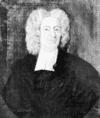Mather, Cotton
born Feb. 12, 1663, Boston, Massachusetts Bay Colony
died Feb. 13, 1728, Boston
American Puritan leader.
The son of Increase Mather, he earned a master's degree from Harvard College and was ordained a Congregational minister in 1685, after which he assisted his father at Boston's North Church (1685–1723). He helped work for the ouster of the unpopular British governor of Massachusetts, Edmund Andros (1689). Though his writings on witchcraft fed the hysteria that resulted in the
Salem witch trials, he disapproved of the trials and argued against the use of "spectral evidence." His best-known writings include
Magnalia Christi Americana (1702), a church history of New England, and
his Diary (1711–12). His
Curiosa Americana (1712–24) won him membership in the Royal Society of London. He was an early supporter of smallpox inoculation. See also
Congregationalism;
Puritanism.
Cotton Mather, portrait by Peter Pelham; in the collection of the American Antiquarian Society, ...
Courtesy of the American Antiquarian Society, Worcester, Mass.
* * *
▪ American religious leader
born Feb. 12, 1663, Boston, Massachusetts Bay Colony [U.S.]
died Feb. 13, 1728, Boston
American Congregational minister and author, supporter of the old order of the ruling clergy, who became the most celebrated of all New England Puritans. He combined a mystical strain (he believed in the existence of witchcraft) with a modern scientific interest (he supported smallpox inoculation).
The son of Increase Mather and the grandson of John Cotton and Richard Mather, Cotton Mather lived all his life in Boston. He entered Harvard at the age of 12, easily passing entrance requirements to read and write Latin and to “decline the Greek nouns and verbs.” He devoted himself unremittingly to study and prayer. At 18 he received his M.A. degree from the hands of his father, who was president of the college.
Mather once noted that his life was “a continual conversation with heaven,” but he spent agonizing hours convinced that he was damned and equal time in ecstasies that he was not. For a while, he feared he could not enter the ministry because of a speech impediment, and he considered becoming a physician; the subject of medicine was of lifelong interest to him. After a friend persuaded him “to oblige himself to a dilated Deliberation in speaking,” he conquered his weakness and returned to religious studies. He preached his first sermon in his father's church in August 1680 and in October another from his grandfather John Cotton's pulpit. He was formally ordained in 1685 and became his father's colleague.
He devoted his life to praying, preaching, writing, and publishing and still followed his main purpose in life of doing good. His book, Bonifacius, or Essays to Do Good (1710), instructs others in humanitarian acts, some ideas being far ahead of his time: the schoolmaster to reward instead of punish his students, the physician to study the state of mind of his patient as a probable cause of illness. He established societies for community projects.
He joined his father in cautioning judges against the use of “spectre evidence” (testimony of a victim of witchcraft that he had been attacked by a spectre bearing the appearance of someone he knew) in the witchcraft trials and in working for the ouster of Sir Edmund Andros as governor of Massachusetts. He was also a leader in the fight for inoculation against
smallpox, incurring popular disapproval. When Cotton inoculated his own son, who almost died from it, the whole community was wrathful, and a bomb was thrown through his chamber window. Satan seemed on the side of his enemies; various members of his family became ill, and some died. Worst of all, his son Increase was arrested for rioting.
Mather's interest in science and particularly in various American phenomena—published in his Curiosa Americana (1712–24)—won him membership in the Royal Society of London. His account of the inoculation episode was published in the society's transactions. He corresponded extensively with notable scientists, such as Robert Boyle. His Christian Philosopher (1721) recognizes God in the wonders of the earth and the universe beyond; it is both philosophical and scientific and, ironically, anticipates 18th-century Deism, despite his clinging to the old order.
Cotton Mather wrote and published more than 400 works. His magnum opus was Magnalia Christi Americana (1702), an ecclesiastical history of America from the founding of New England to his own time. His Manuductio ad Ministerium (1726) was a handbook of advice for young graduates to the ministry: on doing good, on college love affairs, on poetry and music, and on style. His ambitious 20-year work on biblical learning was interrupted by his death.
He died only five years after his father, whose colleague he had been for 40 years. Of 15 children by his three wives—Abigail Phillips, Elizabeth (née Clark) Hubbard, and Lydia (née Lee) George—only two survived him.
Cotton Mather's heritage from his two grandfathers, Richard Mather and John Cotton, was both fortunate and unfortunate. Like them, he had an active mind and the will to use it. He lived in the shadow of their greatness and expected to carry on the tradition and to assume their role in the Puritan community. Unfortunately, he could not see that the old order was passing. As colonial communities became more secure from earlier hardships of settlements, they also became more complacent and less in need of a confining spiritual leadership. Cotton fought for the continuance of the old order of the ruling clergy, sometimes with frustration, sometimes in anger. His
Diary was edited by W.C. Ford (1911–12).
Additional Reading
Barrett Wendell,
Cotton Mather (1891, reprinted 1980); David Levin,
Cotton Mather: The Young Life of the Lord's Remembrancer, 1663–1703 (1978); Kenneth Silverman,
The Life and Times of Cotton Mather (1984).
* * *
Источник: Mather, Cotton


